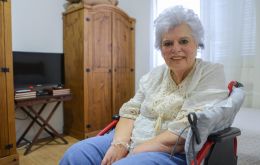MercoPress. South Atlantic News Agency
Tag: euthanasia
-
Monday, November 3rd 2025 - 10:14 UTC
All eyes on Uruguay's volunteers for euthanasia

The cases of Uruguayan nationals Pablo Cánepa, 39, and Beatriz Gelós, 71, have swept under the limelight following the enactment of the so-called Dignified Death Law bill (or Euthanasia Law). They both suffer from conditions recognized as irreversible and have expressed their intention to seek that procedure once it is finally regulated. Their cases were even mentioned in the parliamentary debate leading to the reform.
-
Thursday, October 16th 2025 - 10:57 UTC
Uruguay passes Latin America's first euthanasia law

Uruguay made history on Wednesday by becoming the first country in Latin America to legalize euthanasia through legislation, joining the small group of nations in the world that allow and regulate the right to die with dignity.
-
Thursday, August 21st 2025 - 06:45 UTC
Liberal Uruguay and the right to die (legal assisted dying), The Economist

Pablo Canepa was a normal, healthy 35-year-old Uruguayan. Handsome and extroverted, he was a talented graphic designer who loved to host barbecues with his girlfriend and was fanatical about Nacional, a local football team. Taking a shower in March 2022, he suddenly felt dizzy. He thought little of it.
-
Tuesday, August 12th 2025 - 10:02 UTC
President Orsi endorses Uruguay's new euthanasia bill

Uruguayan President Yamandú Orsi announced he was in favor of the revised “dignified death” bill about to be voted on in the House of Representatives. The proposed law would decriminalize euthanasia for mentally competent adults with incurable diseases or unbearable suffering. The new project is a modified version of a previous one approved by the House in 2022 but stalled in the Senate.
-
Monday, May 12th 2025 - 11:19 UTC
France to resume parliamentary debate on assisted dying

France's Parliament is expected to resume this week the discussion on whether to legalize euthanasia or any other form of “dignified dying,” with two main bills on the table, one focusing on palliative care and the other seeking to move forward with assisted suicide. The debate had been halted in June when President Emmanuel Macron dissolved the National Assembly.
-
Friday, March 14th 2025 - 10:04 UTC
New euthanasia bill submitted before Uruguayan Congress

Uruguayan lawmakers submitted a new euthanasia bill before the Lower House, reviving a proposal already passed there in 2022 but stalled in the Senate. The bill, introduced by deputies from the Colorado Party (PC) and the ruling Brooad Front (Frente Amplio - FA), is supported by a multiparty coalition including members of the Partido Nacional and Partido Independiente. The initiative seeks to allow assisted death for individuals with terminal, incurable, and irreversible diseases.
-
Tuesday, January 7th 2025 - 21:07 UTC
Uruguayan future lawmakers hope to get euthanasia legalized shortly

The incoming administration of Uruguay's future President Yamandú Orsi taking office on March 1 may see the euthanasia bill passed, it was reported this week in Montevideo. The initiative is currently stalled in the Senate.
-
Monday, October 28th 2024 - 08:48 UTC
Cicero's case rekindles debate on euthanasia and assisted suicide in Brazil

The case of Brazilian poet and composer António Cicero, who died through euthanasia last week in Switzerland, has rekindled the debate in South America's largest country on whether such a practice should be legalized, Agencia Brasil reported Sunday.
-
Saturday, April 13th 2024 - 10:43 UTC
Ecuador's govt issues guidelines for application of euthanasia

Ecuador's conservative government of President Daniel Noboa Friday issued the guidelines for the implementation of euthanasia following the Constitutional Court's (CC) instructions in a ruling granting the request of 42-year-old amyotrophic lateral sclerosis (ALS) patient Paola Roldán who died on March 11. The malady is also known as Lou Gehrig's disease.
-
Sunday, April 16th 2023 - 12:15 UTC
Dutch gov't to extend euthanasia option to children aged 1 to 12

Dutch Health Minister Ernst Kuipers Friday announced that regulations were being drafted so that euthanasia can be applied to that small group of children aged 1 to 12 “for whom palliative care options are not sufficient to alleviate their suffering” and who has “such a serious illness or disorder that death is inevitable.”
